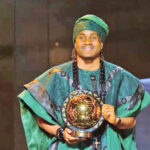Last Wednesday was the first time I was on a train journey, since the devastating bandits’ attack on the service in February last year. One took the Abuja to Kaduna train with plenty of apprehensions, especially recalling the brutal experience of those who took that fatal train last year. This time the train was still comfortable enough and the heavy presence of fierce-looking battle-ready security men strolling up and down the coaches allayed some fear. Fortunately, I also had an engrossing reading material: Professor Akinjide Osuntokun’s well-researched and well-written book on the life and times of S. L. Akintola, the last premier of Western Region. It was the book I read aboard the train to Kaduna and was able to complete on the return journey, the next day.
The book tells the story of Chief Akintola who was among the Nigerian leaders including Sardauna Ahmadu Bello, Abubakar Tafawa Balewa, Brigadier Zakariya Maimalari, and others who were all targeted for cleansing by a mutinous group of the Nigerian Army during the coup of January 15, 1966. Akintola was savagely murdered that early morning of the day by Captain Emmanuel Nwobosi who led a coterie of soldiers drawn from the Abeokuta Garrison to attack the Premier’s Lodge in Ibadan. Akintola was born in Ogbomosho to a family of traders. The Ogbomosho people are reputed to be the most travelled among the Yoruba making them more amenable to other cultures. Akintola lived in Minna as a boy with his parents where he learnt to speak the Hausa language.
He trained as a lawyer in the UK and became one of the founders of the Action Group (AG) in 1951 under the leadership of Obafemi Awolowo. He was the deputy president of the AG and participated actively in all the nationalists’ activities to oust the British colonialists. In the pre-independence parliament, Akintola was a prominent minister in the 1950s in the federal cabinet where with his affable and outgoing nature he established lasting good relations with other ministers from the opposing parties particularly those representing the NPC, Abubakar Tafawa Balewa, Inuwa Wada, and Muhammadu Ribadu.
At independence, he switched roles with his leader Awolowo who decided to go to the federal parliament as leader of the opposition and allowed Akintola to return to the parliament in the west as Premier of the region. Their relationship soon spiralled into bitter antagonism as Awolowo tried to keep a tight rein on the happenings in the West to the bewilderment of Premier Akintola. All attempts by Awolowo to control Akintola’s government failed and that, even, drove him to an alliance with the NPC, regarded as the mortal enemy of AG.
- Tension in Bauchi over allocation of cemetery
- Unclaimed dividends in tier one banks increase by over N5bn
Other events unfolded which resulted in sending Awolowo and many of his key supporters to lengthy terms in jail for treasonable felonies against the Nigerian government. Violence broke out throughout the West after the 1965 elections which Akintola’s new party the NNDP won with the heavy-handed support of the NPC-controlled federal government. This violence in the West went unchecked until it culminated in an opportunity for renegade soldiers to strike.
After the coup, there was a groundswell of sympathy for all the political and military leaders who were killed during the coup. However, there was hardly a show of empathy for the fate of Akintola, particularly from his people in the Western Region. This much is understandable because within that period Akintola was very unpopular in the West due to the titanic battle he was embroiled in with Chief Obafemi Awolowo, the acclaimed leader of the Yoruba.
Now for Osuntokun to take on the analyses of the times of Akintola with some degree of fairness it was deemed, ‘more than ordinarily audacious’ even by Professor E. A. Ayandele, the late distinguished historian, who wrote the forward to the book. This is because as Ayandele put it, Akintola had been ‘so unpopular and execrable to be labelled by his political enemies in Yorubaland as a 20th Century Afonja’. Readers might wish to know that Afonja was the 19th Century warlord thought to have betrayed his Oyo masters and allowed the Fulani Jihadists to conquer and take over Ilorin, till today.
It is this effort to redeem the image of Akintola that is replete throughout the book. The comparison was always with Chief Obafemi Awolowo. Akintola was urbane, outgoing, and open to easily making friends across all divides. Obafemi Awolowo was too stiff, ascetic, and rebuffed making friends, particularly with the leaders from the North. In any case, Awolowo had an ingrained low opinion of the northern leaders whom he regarded as unlettered aristocrats who were no match for the team he led, composed of many degree holders.
Akintola failed in that heroic attempt to build a bridge between the aspirations of the West and the North. His death and the fact that Awolowo was released from prison by the military government gave the ascendancy to that group in the politics of the West for many more years. It was only after the death of Awolowo that serious rapprochement began between the North and the West, starting with Moshood Abiola, then Olusegun Obasanjo, and now Bola Ahmed Tinubu.
We conclude the discussion next week.

 Join Daily Trust WhatsApp Community For Quick Access To News and Happenings Around You.
Join Daily Trust WhatsApp Community For Quick Access To News and Happenings Around You.


